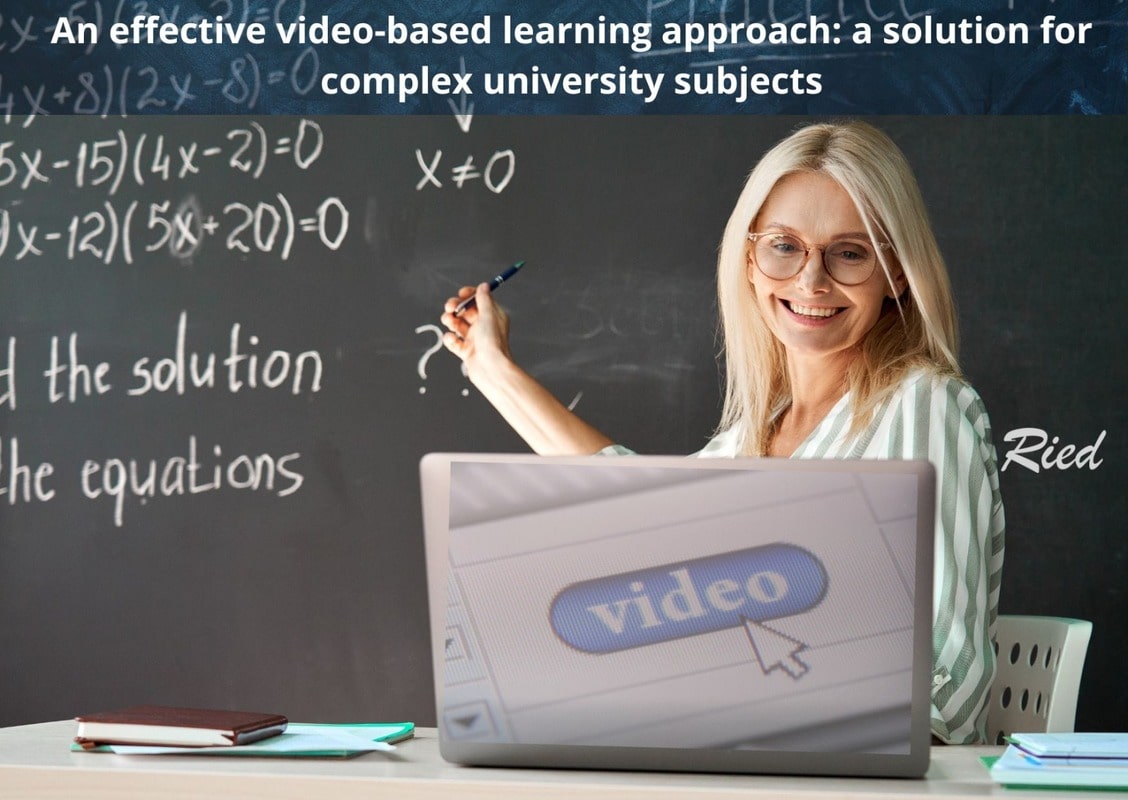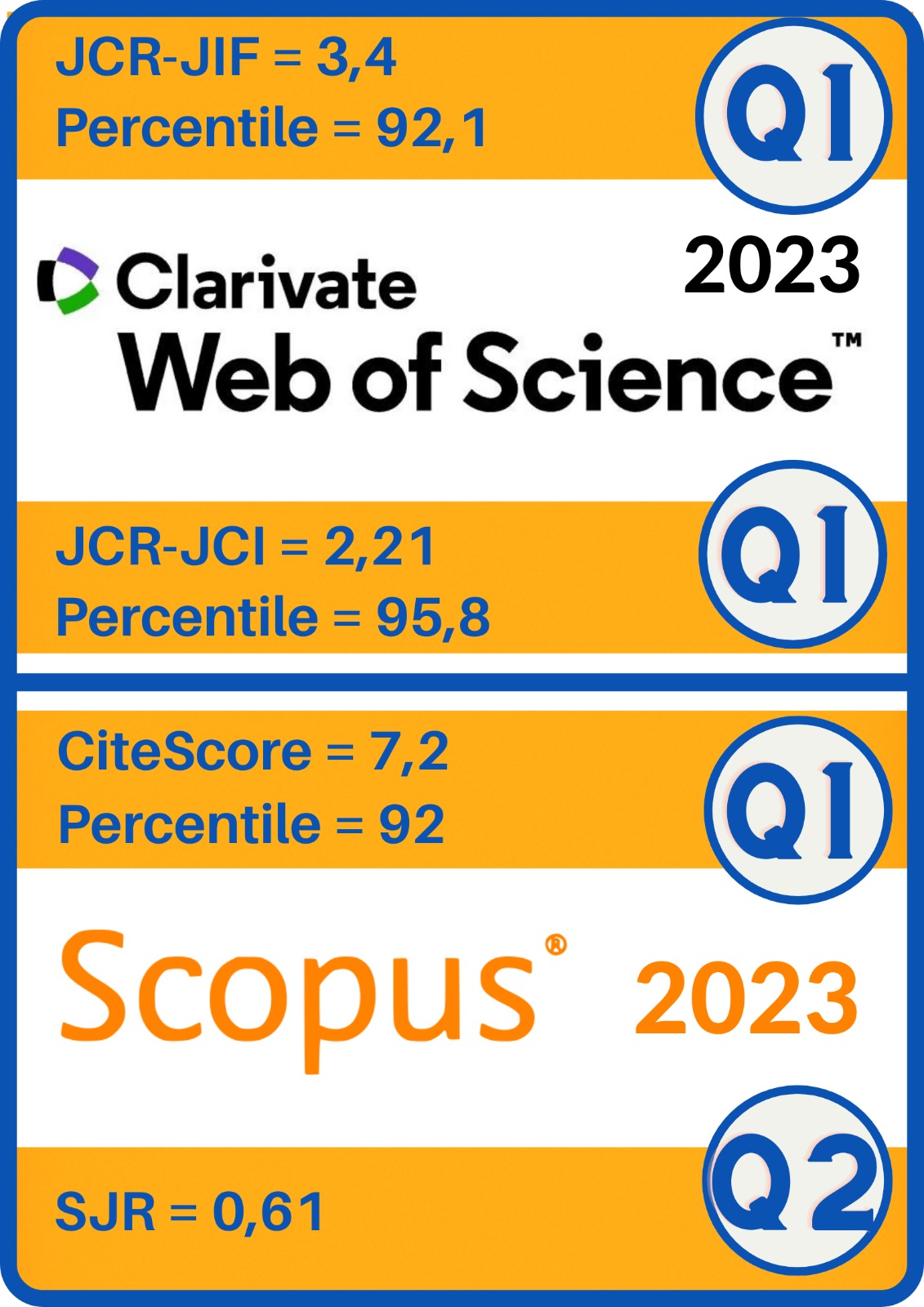An effective video-based learning approach: a solution for complex university subjects
DOI:
https://doi.org/10.5944/ried.27.1.37569Keywords:
difficulty map, visual learning, accounting, feedback, higher educationAbstract
This research presents a tool that offers an agile solution for university subjects perceived by students to be significantly complex. The tool combines, on the one hand, video-based learning and, on the other hand, a system for assessing difficulty prior to the production of videos. As a starting point, student feedback was used to obtain a map of subject difficulty. Based on the identifying markers on this map, a set of ad hoc videos was prepared to address the key and most difficult issues. After using these videos in their preparation in the subject, students completed a satisfaction survey, which was qualitatively validated by experts and quantitatively validated with a Cronbach's alpha test. The results of this survey reflect the usefulness of the designed learning proposal and the interest aroused in the students. Likewise, through statistical analysis, an improvement in the academic performance of students with access to these videos compared to the control group was revealed. Using an accounting subject for a pilot test has enabled the construction of a learning proposal that can be extrapolated to any field of knowledge. The proposed system thus contributes an effective teaching process for students and allows them to be protagonists in their own academic training.
FULL ARTICLE:
https://revistas.uned.es/index.php/ried/article/view/37569/28127
Downloads
References
Barrera, H. M., Barragán, T. M., & Ortega, G. E. (2017). La realidad educativa ecuatoriana desde una perspectiva docente. Revista Iberoamericana de Educación, 75(2), 9-20. https://doi.org/10.35362/rie7522629
Bland, J. M., & Altman, D. G. (1997). Statistics notes: Cronbach's alpha. BMJ, 314, 572. https://doi.org/10.1136/bmj.314.7080.572
Brame, C. J. (2016). Effective educational videos: Principles and guidelines for maximizing student learning from video content. CBE—Life Sciences Education, 15(es6), 1-6. https://doi.org/10.1187/cbe.16-03-0125
Bravo, G., & Cáceres, M. (2006). El proceso de enseñanza-aprendizaje desde una perspectiva comunicativa. Revista Iberoamericana de Educación, 38(7), 1-7. https://doi.org/10.35362/rie3872607
Camacho Miñano, M. D. M., Urquía Grande, E., Pascual Ezama, D., & Rivero Menéndez, M. J. (2016). Recursos multimedia para el aprendizaje de Contabilidad Financiera en los grados bilingües. Educación XX1, 19(1), 63-89. https://doi.org/10.5944/educxx1.15578
Campoverde-Luque, R. I., Zambrano-Torres, R. D. R., Arellano-Pintado, M. S., & Cantos-Arellano, T. M. (2022). Implementación de la Propuesta BCC: Aplicación de la práctica contable desde la virtualidad en el proceso de enseñanza-aprendizaje en la asignatura de contabilidad. 593 Digital Publisher CEIT, 7(4-2), 157-174. https://doi.org/10.33386/593dp.2022.4-2.1212
Caurcel Cara, M. J., & Crisol Moya, E. (2022). Ciberacoso en estudiantes universitarios antes y durante el confinamiento por la COVID-19. Educación XX1, 25(1), 67-91. https://doi.org/10.5944/educxx1.30525
Chugh, R., Macht, S., & Harreveld, B. (2022). Supervisory feedback to postgraduate research students: a literature review. Assessment & Evaluation in Higher Education, 47(5), 683-697. https://doi.org/10.1080/02602938.2021.1955241
Cleland, J., McKimm, J., Fuller, R., Taylor, D., Janczukowicz, J., & Gibbs, T. (2020). Adapting to the impact of COVID-19: Sharing stories, sharing practice. Medical Teacher, 42(7), 772-775. https://doi.org/10.1080/0142159X.2020.1757635
Dong, C., & Goh, P. S. (2015). Twelve tips for the effective use of videos in medical education. Medical Teacher, 37(2), 140-145. https://doi.org/10.3109/0142159X.2014.943709
Evans, C. (2013). Making Sense of Assessment Feedback in Higher Education. Review of Educational Research, 83(1), 70-12. https://doi.org/10.3102/0034654312474350
Fogarty, T. J. (2020). Accounting education in the post-COVID world: looking into the Mirror of Erised. Accounting Education, 29(6), 563-571. https://doi.org/10.1080/09639284.2020.1852945
Giannakos, M. N., Sampson, D. G., & Kidziński, Ł. (2016) Introduction to smart learning analytics: foundations and developments in video-based learning. Smart Learning Environments, 3(1), 1-9. https://doi.org/10.1186/s40561-016-0034-2
Gil-Galván, R., & Gil-Galván, F. J (2021). Percepciones de los estudiantes universitarios sobre las competencias adquiridas mediante el aprendizaje basado en problemas. Educación XX1, 24(1), 271-295. https://doi.org/10.5944/educxx1.26800
Hair, J. F., Risher, J. J., Sarstedt, M., & Ringle, C. M. (2019). When to use and how to report the results of PLS-SEM. European Business Review, 31(1), 2-24. https://doi.org/10.1108/EBR-11-2018-0203
Han, F., & Ellis, R. A. (2019). Using phenomenography to tackle key challenges in science education. Frontiers in Psychology, 10, 1414. https://doi.org/10.3389/fpsyg.2019.01414
Kay, R. H. (2012). Exploring the use of video podcasts in education: A comprehensive review of the literature. Computers in Human Behavior, 28(3), 820-831. https://doi.org/10.1016/j.chb.2012.01.011
Kim, D., Jo, I. H., Song, D., Zheng, H., Li, J., Zhu, J., Huang, X., Yan, W., & Xu, Z. (2021). Self-regulated learning strategies and student video engagement trajectory in a video-based asynchronous online course: a Bayesian latent growth modeling approach. Asia Pacific Education Review, 22(2), 305-317. https://doi.org/10.1007/s12564-021-09690-0
Ljubojevic, M., Vaskovic, V., Stankovic, S., & Vaskovic, J. (2014). Using Supplementary Video in Multimedia Instruction as a Teaching Tool to Increase Efficiency of Learning and Quality of Experience. International Review of Research in Open and Distributed Learning, 15(3), 275-291. https://doi.org/10.19173/irrodl.v15i3.1825
Madariaga, L., Nussbaum, M., Gutiérrez, I., Barahona, C., & Meneses, A. (2021). Assessment of user experience in video-based learning environments: From design guidelines to final product. Computers & Education, 167, 104176. https://doi.org/10.1016/j.compedu.2021.104176
Martín-Cuadrado, A. M., Lavandera-Ponce, S., Mora-Jaureguialde, B., Sánchez-Romero, C., & Pérez-Sánchez, L. (2021). Working methodology with public universities in Peru during the pandemic—continuity of virtual/online teaching and learning. Education Sciences, 11(7), 351. https://doi.org/10.3390/educsci11070351
Medina López, A., Delgado Jalón, M. L., & Cámara Sánchez, A. (2021). Consequences of covid-19 in higher education. Online or presential teaching? Journal of Management and Business Education, 4(3), 275-288. https://doi.org/10.35564/jmbe.2021.0016
Nicol, D., Thomson, A., & Breslin, C. (2014). Rethinking feedback practices in higher education: a peer review perspective. Assessment & Evaluation in Higher Education, 39(1), 102-122. https://doi.org/10.1080/02602938.2013.795518
Renkl, A., & Scheiter, K. (2017). Studying visual displays: How to instructionally support learning. Educational Psychology Review, 29(3), 599-621. https://doi.org/10.1007/s10648-015-9340-4
Reyes-Menéndez, A., Saura, J. R., & Martínez-Navalón, J. G. (2019). The impact of e-WOM on hotels management reputation: exploring tripadvisor review credibility with the ELM model. IEEE Access, 7, 68868-68877. https://doi.org/10.1109/ACCESS.2019.2919030
Rodríguez, M., Huerta, P., Valencia, C., Montano, E., & Ortega, Y. (2023). Innovación educativa con redes sociales aplicada a la asignatura de Salud Pública. Educación Médica, 24(3), 100798. https://doi.org/10.1016/j.edumed.2023.100798
Sablić, M., Mirosavljević, A., & Škugor, A. (2021). Video-based learning (VBL)—past, present and future: An overview of the research published from 2008 to 2019. Technology, Knowledge and Learning, 26(4), 1061-1077. https://doi.org/10.1007/s10758-020-09455-5
Sangster, A., Stoner, G., & Flood, B. (2020). Insights into accounting education in a COVID-19 world. Accounting Education, 29(5), 431-562. https://doi.org/10.1080/09639284.2020.1808487
Schworm, S., & Renkl, A. (2007). Learning argumentation skills through the use of prompts for self-explaining examples. Journal of Educational Psychology, 99(2), 285. https://doi.org/10.1037/0022-0663.99.2.285
Scott, S. V. (2014). Practising what we preach: towards a student-centred definition of feedback. Teaching in Higher Education, 19(1), 49-57. https://doi.org/10.1080/13562517.2013.827639
Segovia-García, N., Said-Hung, E., & García Aguilera, F. (2022). Educación Superior virtual en Colombia: factores asociados al abandono. Educación XX1, 25(1), 197-218. https://doi.org/10.5944/educxx1.30455
Vedder-Weiss, D., Segal, A., & Lefstein, A. (2019). Teacher face-work in discussions of video-recorded classroom practice: Constraining or catalyzing opportunities to learn? Journal of Teacher Education, 70(5), 538-551. https://doi.org/10.1177/0022487119841895
Villaseñor Rodríguez, I. (2014). Las preguntas frecuentes como herramienta metodológica para el estudio del fenómeno de las necesidades de información: el caso de las bibliotecas universitarias madrileñas. In J. Ríos Ortega & C. A. Ramírez Vázquez, (Coord.), Naturaleza y método de la investigación bibliométrica y de la información (173-179). Universidad Nacional Autónoma de México. https://ru.iibi.unam.mx/jspui/handle/IIBI_UNAM/CL380
Winstone, N., Boud, D., Dawson, P., & Heron, M. (2022). From feedback-as-information to feedback-as-process: a linguistic analysis of the feedback literature. Assessment & Evaluation in Higher Education, 47(2), 213-230. https://doi.org/10.1080/02602938.2021.1902467
Yousef, A. M. F., Chatti, M. A., & Schroeder, U. (2014a). The state of video-based learning: A review and future perspectives. International Journal on Advances in Life Sciences, 6(3), 122-135.
Yousef, A. M. F., Chatti, M. A., & Schroeder, U. (2014b). Video-based learning: A critical analysis of the research published in 2003-2013 and future visions. In eLmL 2014, The Sixth International Conference on Mobile, Hybrid, and On-line Learning, 112-119.
Zhao, F. (2019). Using Quizizz to integrate fun multiplayer activity in the accounting classroom. International Journal of Higher Education, 8(1), 37-43. https://doi.org/10.5430/ijhe.v8n1p37

Downloads
Published
How to Cite
Issue
Section
License
Copyright (c) 2023 Alba Gómez-Ortega, Almudena Macías-Guillén, Miguel Ángel Sánchez-de Lara, Maria Luisa Delgado-Jalón

This work is licensed under a Creative Commons Attribution 4.0 International License.
The articles that are published in this journal are subject to the following terms:
1. The authors grant the exploitation rights of the work accepted for publication to RIED, guarantee to the journal the right to be the first publication of research understaken and permit the journal to distribute the work published under the license indicated in point 2.
2. The articles are published in the electronic edition of the journal under a Creative Commons Attribution 4.0 International (CC BY 4.0) license. You can copy and redistribute the material in any medium or format, adapt, remix, transform, and build upon the material for any purpose, even commercially. You must give appropriate credit, provide a link to the license, and indicate if changes were made. You may do so in any reasonable manner, but not in any way that suggests the licensor endorses you or your use.
3. Conditions for self-archiving. Authors are encouraged to disseminate electronically the OnlineFirst version (assessed version and accepted for publication) of its articles before publication, always with reference to its publication by RIED, favoring its circulation and dissemination earlier and with this a possible increase in its citation and reach among the academic community.







